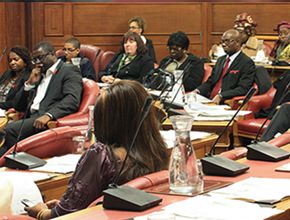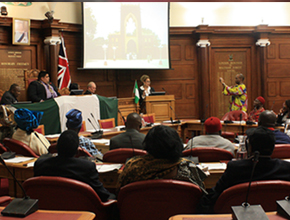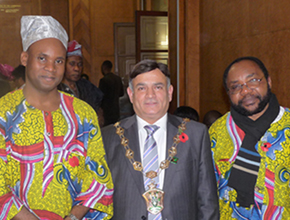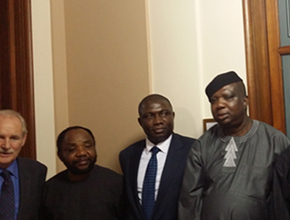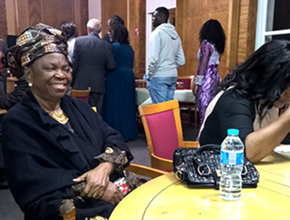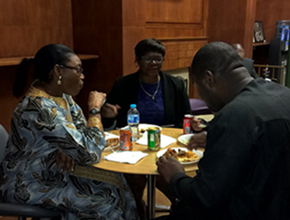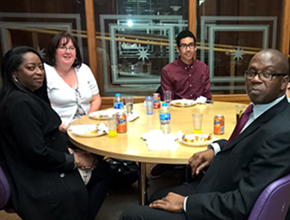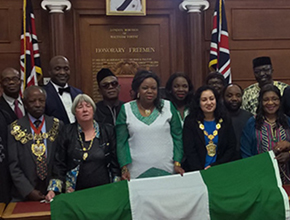Nigerian Leaders
Nigeria We Need A Good Leader
A Country Where Everyone Lives in Fear Of One Another.
A question of confidence arose and no one - Governors nor Governed answered why Nigerians lack trust and confidence on each other. No nation can be developed with this type of mentality and uncertainty thereof. How can this country succeed in administering 180m souls with such a fragile confidence as delicate as a pot made of clay? Or, using a more local colloquial, can scorpions, wasps and bees live in the same house? The aforementioned (bleak) assertion can be attributed to the formation of Nigeria as a fake country by the colonialists. In other words, the coming together of the various unteachable, unlearning and disgruntling sections to make Nigeria with their disparate customs have made the people very unreliable. No land is ever level but wise people work to level it to their comfort. What sustained the Igbos from 874th year of man on earth; the Yorubas from their origin; the Hausas, etc from their origin is very much lacking in Nigeria of today. For instance, the Igbos agreed on terms and conditions (edudo-ala), which protect and promote both the rich and poor, strong and weak, old and young. The problem of ungovernability was foreign to these people as each knew its customary root. If Nigeria is about them, will it totally forsake their customs? What a difficult business to govern hybrids counterfeiting fraudulently?
A word of caution - associating Igbos with Chiukwu (Almighty God) and the rest to their own faiths expose the basic difficulty of bringing different beliefs together. More so, as humans, it highlights the importance of people’s agreement to live together to terms and conditions. Put it another way “all men (and women) were not created equal and if we follow this maxim to its logical conclusion, inequality is a salient feature of the nature of mankind. However, as homo-species, where they gather to live, such agreement must be secured with terms and conditions to live together in harmony; did the so-called Nigerians do this?
Britain brought the disparate parties together to form a nation akin to its own systems and structures. Look at Britain - it has conventions, custom/common laws and civil laws. The Lords in Britain are a delightful eye for justice. In Britain, there are strata (King/Queen, Lords, Commons, Local Authority and Wards) which constitute levels of enforcement. These layers provide the checks and balances to ensure that things move on well. In spite, Brexit challenged such old culture as the atomism of the nation has failed to configure. The separation of powers is a model for good governance of a country. Under this model, a state's government is divided into branches, each with separate but dependable powers and areas of responsibility so that the powers of one branch are not in conflict with the powers associated with the other branches for holistic outcome. The typical division: legislature, executive and judiciary; each depends on the other for national outcome. But there comes a time a nation faces test of unity.
For fifty-eight years of independence, there no shape to determine Nigeria’s nationalism. What transpires more is sectional interest instead of national interest. Instead of developing capacity to accommodate the youths, it is herds or Sharia law to take precedence. A British observer (Dr. Walker Miller 1945 & 1948) seeing the mistakes of the determinants of Nigeria asked: Have we failed? This question was posed to those ruling Nigeria at the time - Sir Frederick Lugard (1900) as Governor-General of two Protectorates (South & North); Sir H. Clifford (1919); Sir G. Thomson (1925); Sir D. Cameron (1931); Sir B Boudillon (1935); Sir J E Shulkburgh (1940); Sir A Burns (1942); Sir A Richards (1943); Sir J. Macpherson (1948); Sir J. W Robertson (1955); Dr N. Azikiwe (1960) and subsequently to 2018 (see below). Foremost, ‘Sir’ means Title Holder as Red Cap Nze in Igbo before AD1441. The assertion here is that these echelons walked through the corridor of justice without seeing anything wrong with their approaches. Yes, they masqueraded to confuse the admixture races but showed them no wisdom and justice to manage their populations. What if any section can manage its population peacefully; can it not be tried for cross sectional learning and development? Did Britain fix Nigeria permanently while no condition is permanent? No, we shall like other entities continue to try options until we achieve stable and sustaining structure.
Nigerian leaders Post Independence 1960-2018
1 Abubakar Tafawa Balewa 1960 -1966
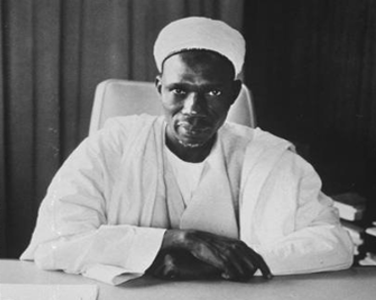 He was a milk boy of Sir James Robertson. Misguided, unknowledgeable of national interest and administration: Sir Tafawa Balewa Abubakar (1960) was the greatest British mistake to reward personal loyalty with national injustice. He had no vision; he messed up the golden independent opportunity for home rule. His mistakes led to the fall of Nigeria on 15 January 1966. First: Hausa; Second: Northerner and Last: Nigeria, he was a disgrace to the black race. Why did he become a national leader if he had only sectional or religious interest?
He was a milk boy of Sir James Robertson. Misguided, unknowledgeable of national interest and administration: Sir Tafawa Balewa Abubakar (1960) was the greatest British mistake to reward personal loyalty with national injustice. He had no vision; he messed up the golden independent opportunity for home rule. His mistakes led to the fall of Nigeria on 15 January 1966. First: Hausa; Second: Northerner and Last: Nigeria, he was a disgrace to the black race. Why did he become a national leader if he had only sectional or religious interest?
2 Major General A. T.U. Ironsi - Jan 1966–July1966
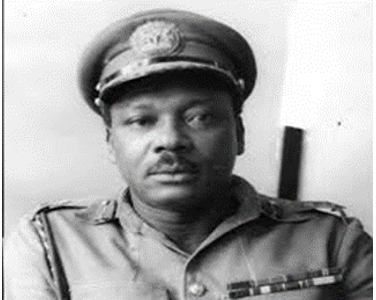 There are moments in life caution becomes a virtue. If fourteen Nigerian army youths led by Nzeogwu failed in the first coup, an Easterner is not the best to take office of the Head of State of grudging sections of Nigeria but a wait and see developments. Ultra-pomposity, he took his position for granted from his Congo Peace-Keeping experience (1960-4). His acceptance of fragile post-coup leadership offended Britain, who opted for Colonel Yakubu Gowon (1966), which was not intervening for good but fuelling dutch- courage for blood that finished Nigeria in time (1967-70). The mentality that made Gowon acceptable and Ironsi unacceptable was not good for Nigerian nationalism and it will, based on equity run Nigeria down because of discriminatory mentality. Ironsi adopted an official process to set a committee led by a British Judge to investigate the first coup. Before the Judge executed the commission, Ironsi had been killed. Ironsi died with unitary or unity of Nigeria. The Judge submitted his report to Gowon. Most remarkable, if Nigeria refused Ironsi’s Unitary system and killed him for that; Nigeria will never succeed as a Unitary system. It does not matter the length of time it takes to be accepted. Equity shall always hold the guilty down. Nigeria, what else?
There are moments in life caution becomes a virtue. If fourteen Nigerian army youths led by Nzeogwu failed in the first coup, an Easterner is not the best to take office of the Head of State of grudging sections of Nigeria but a wait and see developments. Ultra-pomposity, he took his position for granted from his Congo Peace-Keeping experience (1960-4). His acceptance of fragile post-coup leadership offended Britain, who opted for Colonel Yakubu Gowon (1966), which was not intervening for good but fuelling dutch- courage for blood that finished Nigeria in time (1967-70). The mentality that made Gowon acceptable and Ironsi unacceptable was not good for Nigerian nationalism and it will, based on equity run Nigeria down because of discriminatory mentality. Ironsi adopted an official process to set a committee led by a British Judge to investigate the first coup. Before the Judge executed the commission, Ironsi had been killed. Ironsi died with unitary or unity of Nigeria. The Judge submitted his report to Gowon. Most remarkable, if Nigeria refused Ironsi’s Unitary system and killed him for that; Nigeria will never succeed as a Unitary system. It does not matter the length of time it takes to be accepted. Equity shall always hold the guilty down. Nigeria, what else?
-
3 Col. Yakubu Gowan 1966 –Jul.1975
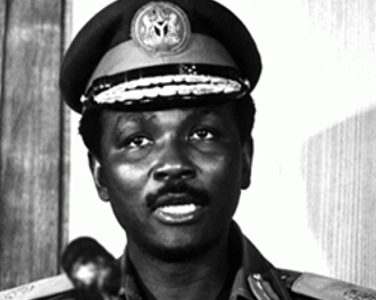 What makes a player e.g. Sir Winston Churchill great is the remedy offered in time of need but Gowon lacking all goodwill took dutch-courage to plunge the country into deeper mess. I am sure, we have comparators in the Israeli-Kingships and Islamic Otto-Caliphate regimes, that damaged the world peaceful process; this was Gowon legacy for Nigeria. The dutch-courage to finish the unknown race; Igbo, is a great stigma to Nigeria. What Gowon assisted by Britain gathered from all over the world to throw at Igbo (Biafra) severed the relationship according to Tai Solarin’s: ‘let a stray bullet fly towards the Eastern sky, you would have dismembered the nation forever’. Gowon should look carefully at the well managed relationship of the UK: of England, Scotland, Wales and Northern Ireland and accept his error. Equity is more resilient than human. It is the dismembered nation that we are dealing with as no regime has sought better. The British Judge above submitted his report to Gowon, who swept it under the carpet and opted for rough Nigeria. He however said that there is no basis for unity except corruption, cheating and waste. The dutch-courage for war was foreign to him. He was a failed Christian till-date by lack of remorse for failing to publish the Judge’s report. Gowon alter history to betray justice. He caused political subsidence by creating twelve instead of enforcing the four region that gave rise to Nigeria (vide: The Future of Nigeria). In compensating the ECOWAS for supporting him in the war; he made Togo, the capital of ECOWAS. He sold Benin (Bight of Benin) to Dahomey (1975) as making historical Bight of Benin or Benin non-existent in Nigeria. In the same (1975), he renamed Bight of Biafra (of up to 1885), to Bight of Bonny. Yet, he did not change anything the Central or Northern regions. He entered dangerous political and economic pacts with Chief Awolowo (West) alias, indigenisation as fencing out the East, two years after the war. He also placed a cancerous virus in the East named abandoned property to sabotage Eastern quick reconciliation. With all his punitive measures still in places, what is left for unity? Nigeria? As long as the Almighty God lives, we shall know who controls the world order. Almighty God, Lord of justice, please arise to judge and determine our way-forward.
Further, it has been said that Nigerians have oil but Nigeria has no oil because Gowon rewarded his military officers with crude oil. These are operational Codes for holders (Source: Nigeria Senate):
• Apo Well awarded to Sapetro owned by Gen. Theophilus Danjuma 300,000 barrels per day;
• OML 110 Obe oil field owned by Alhaji Mai Darbe; Cavendish Petroleum billions of barrels;
• Oml 112 and OML 117 awarded to Amni International Petroleum owned by Sanni Bello; son-in-law of A. Alhaji Abubakar.
• OML 115 alias Oldwok field and Ebok field awarded to Alhaji Muhammed Indimi; in-law of Gen. Ibrahim Babangida.
• Oml 215 operated by Nor East Petroleum owned by Alhaji Saleh Mohammed Gambo.
• OML 113 awarded to Yinka Folawiyo Petroleum Ltd owned by Alhaji W I Folawiyo. Prince Nasiru Ado Bayero cousin to Emir of Kano, Lamido Sanisu owned by Asuokpu/Umutu
• Inter owned by Atiku Abubakar; Yaradua and Ad Bayero exploring Niger Delta.
• Amni 117 owned by Rilwanu Lukman former Chairman of OPEC
• OML 67 owned by Afren PLC owned by Rilwanu Lukman
• OPL 245 own by Dan Etete
• OPL 289 and 233 owned by Peter Odoili, Obasanjo and Sultan of Sokoto.
• OPL 288 own by Andy Ubah, Obasanjo and Gen. Theophilus Y Danjuma.
• Opl 291 own by Emeka Offor
• Mike Adenuga owns Conoil.
The above was started by Gowon to incentivize his army officers and the subsequent leaders and officers instead stopping it promoted it whereby Nigeria has no money to development Nigeria because individuals and groups shared out the national minerals to themselves. What bothers justice is the acts of men that take undue influence to halt national sound evolution. Gowon and his associates are answerable for Nigeria’s backwardness; at least in the case of India and Pakistan, instead of blood, they separated and now negotiating unity like East and West Germany. ‘You shall not kill’, where has unity worked out well after killing? Has Iran and Iraq pacified after that ugly mischievous discretions? Since granted amnesty in 1983, Gowon became Christian Evangelist with soiled hand (Isaiah 1). Abraham confessed and covenanted before becoming faithful. All that Gowon needed was to excuse his past by confession. The last straw of Gowon as a bad leader was his inability to execute the ‘Aburi Accord’, which led to the war 1967-1970. What is left of the East to reconstitute Nigeria? Nigerians hated truth and this is the myth that promotes corruption; else, live and let live, how can it raise eye ball? A supposed reputable person, once bribed acts personally rather than nationally. This is how persons, potential leaders got rewarded at the expense of the nation. As equity waits for the last act, I humbly pray and invite the Almighty God of Justice to render judgment. Why should good things happening elsewhere be denied to Nigerians?
What makes a player e.g. Sir Winston Churchill great is the remedy offered in time of need but Gowon lacking all goodwill took dutch-courage to plunge the country into deeper mess. I am sure, we have comparators in the Israeli-Kingships and Islamic Otto-Caliphate regimes, that damaged the world peaceful process; this was Gowon legacy for Nigeria. The dutch-courage to finish the unknown race; Igbo, is a great stigma to Nigeria. What Gowon assisted by Britain gathered from all over the world to throw at Igbo (Biafra) severed the relationship according to Tai Solarin’s: ‘let a stray bullet fly towards the Eastern sky, you would have dismembered the nation forever’. Gowon should look carefully at the well managed relationship of the UK: of England, Scotland, Wales and Northern Ireland and accept his error. Equity is more resilient than human. It is the dismembered nation that we are dealing with as no regime has sought better. The British Judge above submitted his report to Gowon, who swept it under the carpet and opted for rough Nigeria. He however said that there is no basis for unity except corruption, cheating and waste. The dutch-courage for war was foreign to him. He was a failed Christian till-date by lack of remorse for failing to publish the Judge’s report. Gowon alter history to betray justice. He caused political subsidence by creating twelve instead of enforcing the four region that gave rise to Nigeria (vide: The Future of Nigeria). In compensating the ECOWAS for supporting him in the war; he made Togo, the capital of ECOWAS. He sold Benin (Bight of Benin) to Dahomey (1975) as making historical Bight of Benin or Benin non-existent in Nigeria. In the same (1975), he renamed Bight of Biafra (of up to 1885), to Bight of Bonny. Yet, he did not change anything the Central or Northern regions. He entered dangerous political and economic pacts with Chief Awolowo (West) alias, indigenisation as fencing out the East, two years after the war. He also placed a cancerous virus in the East named abandoned property to sabotage Eastern quick reconciliation. With all his punitive measures still in places, what is left for unity? Nigeria? As long as the Almighty God lives, we shall know who controls the world order. Almighty God, Lord of justice, please arise to judge and determine our way-forward.
Further, it has been said that Nigerians have oil but Nigeria has no oil because Gowon rewarded his military officers with crude oil. These are operational Codes for holders (Source: Nigeria Senate):
• Apo Well awarded to Sapetro owned by Gen. Theophilus Danjuma 300,000 barrels per day;
• OML 110 Obe oil field owned by Alhaji Mai Darbe; Cavendish Petroleum billions of barrels;
• Oml 112 and OML 117 awarded to Amni International Petroleum owned by Sanni Bello; son-in-law of A. Alhaji Abubakar.
• OML 115 alias Oldwok field and Ebok field awarded to Alhaji Muhammed Indimi; in-law of Gen. Ibrahim Babangida.
• Oml 215 operated by Nor East Petroleum owned by Alhaji Saleh Mohammed Gambo.
• OML 113 awarded to Yinka Folawiyo Petroleum Ltd owned by Alhaji W I Folawiyo. Prince Nasiru Ado Bayero cousin to Emir of Kano, Lamido Sanisu owned by Asuokpu/Umutu
• Inter owned by Atiku Abubakar; Yaradua and Ad Bayero exploring Niger Delta.
• Amni 117 owned by Rilwanu Lukman former Chairman of OPEC
• OML 67 owned by Afren PLC owned by Rilwanu Lukman
• OPL 245 own by Dan Etete
• OPL 289 and 233 owned by Peter Odoili, Obasanjo and Sultan of Sokoto.
• OPL 288 own by Andy Ubah, Obasanjo and Gen. Theophilus Y Danjuma.
• Opl 291 own by Emeka Offor
• Mike Adenuga owns Conoil.
The above was started by Gowon to incentivize his army officers and the subsequent leaders and officers instead stopping it promoted it whereby Nigeria has no money to development Nigeria because individuals and groups shared out the national minerals to themselves. What bothers justice is the acts of men that take undue influence to halt national sound evolution. Gowon and his associates are answerable for Nigeria’s backwardness; at least in the case of India and Pakistan, instead of blood, they separated and now negotiating unity like East and West Germany. ‘You shall not kill’, where has unity worked out well after killing? Has Iran and Iraq pacified after that ugly mischievous discretions? Since granted amnesty in 1983, Gowon became Christian Evangelist with soiled hand (Isaiah 1). Abraham confessed and covenanted before becoming faithful. All that Gowon needed was to excuse his past by confession. The last straw of Gowon as a bad leader was his inability to execute the ‘Aburi Accord’, which led to the war 1967-1970. What is left of the East to reconstitute Nigeria? Nigerians hated truth and this is the myth that promotes corruption; else, live and let live, how can it raise eye ball? A supposed reputable person, once bribed acts personally rather than nationally. This is how persons, potential leaders got rewarded at the expense of the nation. As equity waits for the last act, I humbly pray and invite the Almighty God of Justice to render judgment. Why should good things happening elsewhere be denied to Nigerians? 4 General Muritala R. Mohammed 1975 –1976
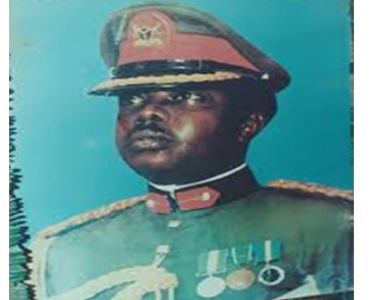 Colonel Joe Nanven Garba set Gowon aside on 2 July 1975 and put General Muritala Mohammed, who was killed in an attempted coup led by Lt. Col. Buka Suka Dimka 1976. You can notice faction and national chaos ruining Nigeria. The military feared Gowon’s suggestion of returning the country to civil regime in 1976. The nation was undergoing grounding fuelled by its friendly foes, who planned to benefit in its chaos; hence, there were refineries in nearby neighbours but not in Nigeria. Muritala’s love for Nigeria was wasted either as retribution or unworthiness but he started as a cleaner. Nigeria, what else?
Colonel Joe Nanven Garba set Gowon aside on 2 July 1975 and put General Muritala Mohammed, who was killed in an attempted coup led by Lt. Col. Buka Suka Dimka 1976. You can notice faction and national chaos ruining Nigeria. The military feared Gowon’s suggestion of returning the country to civil regime in 1976. The nation was undergoing grounding fuelled by its friendly foes, who planned to benefit in its chaos; hence, there were refineries in nearby neighbours but not in Nigeria. Muritala’s love for Nigeria was wasted either as retribution or unworthiness but he started as a cleaner. Nigeria, what else?
5 General Olusegun Obasanjo 1976 –1979
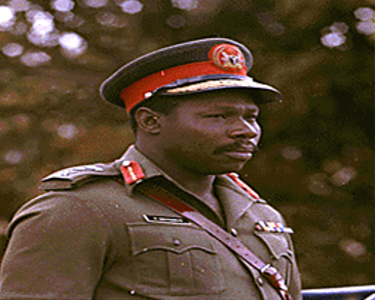 The provisional government (1976) led by Gen. S. Obasanjo cowardly hacked out unworkable Military constitution for the subsequent civilian regime led by Alhaji Shehu Shagari. Failure of Gowon to disclose the Report of the Judge, Obasanjo wrote ‘Nzeogwu’ to disclose the causes of the first coup but while the president, he rectified nothing. He would have published the report and then placed the nation on a new stratum but cover-up constipated the nation. When a nation openly talk corruption, it has been destroyed.
The provisional government (1976) led by Gen. S. Obasanjo cowardly hacked out unworkable Military constitution for the subsequent civilian regime led by Alhaji Shehu Shagari. Failure of Gowon to disclose the Report of the Judge, Obasanjo wrote ‘Nzeogwu’ to disclose the causes of the first coup but while the president, he rectified nothing. He would have published the report and then placed the nation on a new stratum but cover-up constipated the nation. When a nation openly talk corruption, it has been destroyed.6 Alhaji Shehu Shagari 1979 –1982
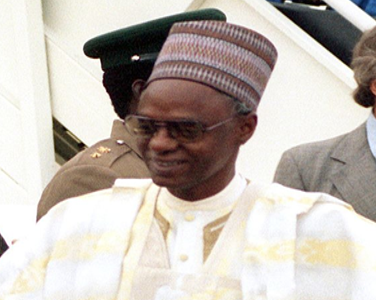 Alhaji S Shagari was unable to adopt the militarily crafted Constitution. The way it works is: if one found the elected duties hard, he resigns for the nation to find another leader but the way it happened in 31 December 1982, was not a coup but back-door-dealing to secure the power in Northerner’s hand thus collaborators ruined the nation. Shagari left no legacy, even a good word for Nigeria.
Alhaji S Shagari was unable to adopt the militarily crafted Constitution. The way it works is: if one found the elected duties hard, he resigns for the nation to find another leader but the way it happened in 31 December 1982, was not a coup but back-door-dealing to secure the power in Northerner’s hand thus collaborators ruined the nation. Shagari left no legacy, even a good word for Nigeria.
7 Gen. M Buhari and Idiagbon 1982-1985
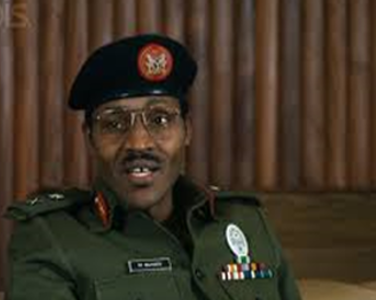 Gen. Buhari and Idiagbon took over from Shagari. No one was fooled of passing power to another Northerner (see below). All through, they wasted the national resources and proved nothing. What did Buhari achieve to warrant his next time?
Gen. Buhari and Idiagbon took over from Shagari. No one was fooled of passing power to another Northerner (see below). All through, they wasted the national resources and proved nothing. What did Buhari achieve to warrant his next time? 8 Gen. Ibrahim Babangida 1985 to 1993
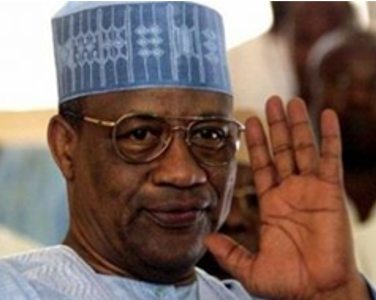 President B Clinton said in 1993 during the inaugural launching of East Timor self-rule; that, it is not right to allow people’s past mistakes to block or ruin their future. Gen. Ibrahim Babangida under-estimated the duties. The persistent question to the leaders is: Nigeria: what else? False news, Nigeria promoted it, where nothing went well but stocking national monies in personal cellars. Babangida attested in 1993 that Nigeria had failed all management, economic and financial techniques. When the power tilted in 1992 election to be favouring a Westerner, Chief MKO Abiola, the North squeaked and rumpled and dwindled to comforting ever hungry baby: Chief Shonekan, who gluttonously accepted to bewail irresolute Yoruba in Nigeria. Why did a Yoruba hope to gain where a Yoruba lost? Babangida grabbed as much as he wanted but left no national legacy.
President B Clinton said in 1993 during the inaugural launching of East Timor self-rule; that, it is not right to allow people’s past mistakes to block or ruin their future. Gen. Ibrahim Babangida under-estimated the duties. The persistent question to the leaders is: Nigeria: what else? False news, Nigeria promoted it, where nothing went well but stocking national monies in personal cellars. Babangida attested in 1993 that Nigeria had failed all management, economic and financial techniques. When the power tilted in 1992 election to be favouring a Westerner, Chief MKO Abiola, the North squeaked and rumpled and dwindled to comforting ever hungry baby: Chief Shonekan, who gluttonously accepted to bewail irresolute Yoruba in Nigeria. Why did a Yoruba hope to gain where a Yoruba lost? Babangida grabbed as much as he wanted but left no national legacy. 9. Chief Ernest Shonekan 1993 for 3 months
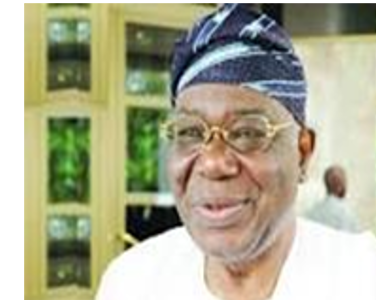 Tricked into forgery that he was used to recompense the West (Yoruba) for Chief MKO Abiola but he was not seated before being set aside by Gen. Abacha.
Tricked into forgery that he was used to recompense the West (Yoruba) for Chief MKO Abiola but he was not seated before being set aside by Gen. Abacha.10. Gen. Abacha 1993-1998
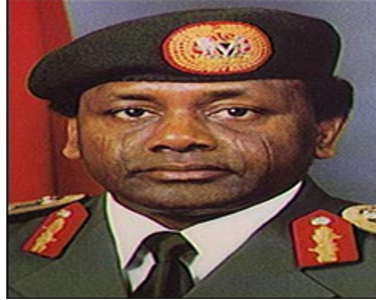 There are times a reputable person can work in principle to refuse an offer he is not more honoured to serve. If the election winning candidate was denied by the Military, what chance exists for an appointee? Chief Ernest was too babyish for the trick. Everyone has a life drive. Abacha was greatly endowed with skills, brevity and blessed with good children but like Antiochus iv, his greed was excessive. Does the Bible or Koran Both grant immunity to wrong doing? Abacha and Abiola died in 1998 and left the country in deeper doubt of self-rule. Nigeria; what else?
There are times a reputable person can work in principle to refuse an offer he is not more honoured to serve. If the election winning candidate was denied by the Military, what chance exists for an appointee? Chief Ernest was too babyish for the trick. Everyone has a life drive. Abacha was greatly endowed with skills, brevity and blessed with good children but like Antiochus iv, his greed was excessive. Does the Bible or Koran Both grant immunity to wrong doing? Abacha and Abiola died in 1998 and left the country in deeper doubt of self-rule. Nigeria; what else?11. Gen. Abdulsalami Alhaji Abubakar 1998 -1999
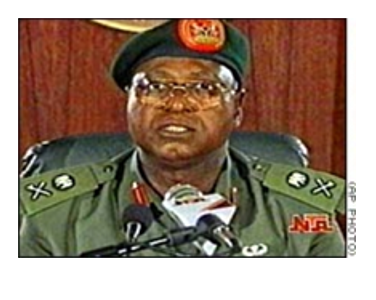 This gentle man, Gen. Abubakar we do not know much of him but he took the political carcase as Gen. Ironsi, to soothe. He crafted the present, dubious and doubtful Constitution of 1999, a great sour to democracy. He handed over to a civilian who if it wanted civilian democracy would rework the Constitution but grasshoppers do not aim high but play baby gains. Ponder a Military Constitution for Civilian democracy. I read the Uneasy lies the Head by Geoffrey Bacco (1959) about the crises in Europe between 1775 and 1959, it never worked. Thus, the Nigerian Constitution drawn by the Military 1999, was not good for Nigeria. Nigeria, what else?
This gentle man, Gen. Abubakar we do not know much of him but he took the political carcase as Gen. Ironsi, to soothe. He crafted the present, dubious and doubtful Constitution of 1999, a great sour to democracy. He handed over to a civilian who if it wanted civilian democracy would rework the Constitution but grasshoppers do not aim high but play baby gains. Ponder a Military Constitution for Civilian democracy. I read the Uneasy lies the Head by Geoffrey Bacco (1959) about the crises in Europe between 1775 and 1959, it never worked. Thus, the Nigerian Constitution drawn by the Military 1999, was not good for Nigeria. Nigeria, what else?12. Chief S. Obasanjo 1999-2007
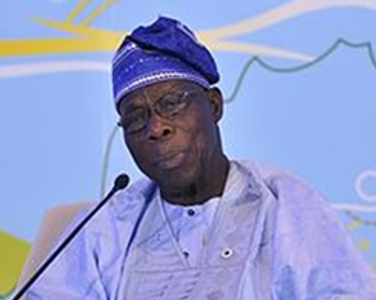 S. Obasanjo was the civilian President to instil and promote democracy. We don’t know what happened because Nigerians tell a lot of lies, this Military/Civilian guru dwarfed off with no national legacy. Indeed, Nigeria is unfortunate of good leaders. He held a Constitutional Conference but achieved no reform. Nigeria, what else?
S. Obasanjo was the civilian President to instil and promote democracy. We don’t know what happened because Nigerians tell a lot of lies, this Military/Civilian guru dwarfed off with no national legacy. Indeed, Nigeria is unfortunate of good leaders. He held a Constitutional Conference but achieved no reform. Nigeria, what else?
13. Umaru M Yar’Adua 2007-2010
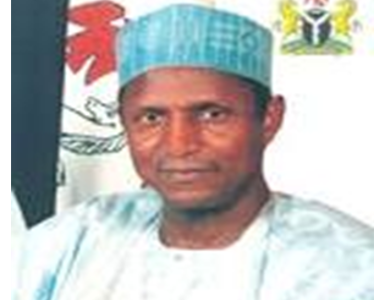 Yar’Adua, they said, he was a nice man but died soon without any legacy adding to Nigeria’s chaos. Nigeria, what else?
Yar’Adua, they said, he was a nice man but died soon without any legacy adding to Nigeria’s chaos. Nigeria, what else?14. Dr. J E Goodluck 2010 - 2015
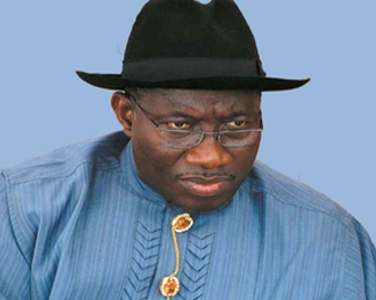 Dr. J. Goodluck, a man from the South-South was too shy to being a bold leader to set Nigeria aright. Nigeria continues to undergo ominous processes. He held a Constitutional Conference and achieved no reform. A Doctor of Zoology can understand human behavioural issues, can’t he? Nigeria needs purging fake leaders, who lack vision and strategic thinking for national development. If Nigeria is well like America or Britain, everyone wound want to belong but with poor mentality, everyone deserts Nigeria. Jonathan was a sale out for seven years in the office; he left no legacy as a favoured leader from the minority area. He worked less than his degrees. Nigeria, what else?
Dr. J. Goodluck, a man from the South-South was too shy to being a bold leader to set Nigeria aright. Nigeria continues to undergo ominous processes. He held a Constitutional Conference and achieved no reform. A Doctor of Zoology can understand human behavioural issues, can’t he? Nigeria needs purging fake leaders, who lack vision and strategic thinking for national development. If Nigeria is well like America or Britain, everyone wound want to belong but with poor mentality, everyone deserts Nigeria. Jonathan was a sale out for seven years in the office; he left no legacy as a favoured leader from the minority area. He worked less than his degrees. Nigeria, what else?15. Alhaji M. Buhari 2015 to-date
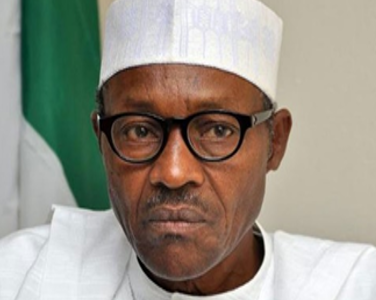 What did Buhari achieve in 1993-5 to motivate a second come back? Buhari, a Constitutional failure of allowing who formerly took power by force (1982) to become President (2015). In campaign, he was quoted as saying: If I do not win, the country shall… but what is becoming a President with nothing to offer? He is numbed and unfit to administer 180m admixture Nigerians. Any leader that is uncomfortable with any section of the people he rules is unworthy of the role. Did we mention any national policies above? No, because mischievous discretion debarred integration and united national processes. The Constitution failed, and the country becomes gloomy with a rare disease of disunity, antipathy and corruption. He hit the nation at its weakest spore; else, how can a national leader identify a problem with knowing how to solve it? Corruption, how did the President identify it without knowing its causes? Mr. President, what causes corruption?
What did Buhari achieve in 1993-5 to motivate a second come back? Buhari, a Constitutional failure of allowing who formerly took power by force (1982) to become President (2015). In campaign, he was quoted as saying: If I do not win, the country shall… but what is becoming a President with nothing to offer? He is numbed and unfit to administer 180m admixture Nigerians. Any leader that is uncomfortable with any section of the people he rules is unworthy of the role. Did we mention any national policies above? No, because mischievous discretion debarred integration and united national processes. The Constitution failed, and the country becomes gloomy with a rare disease of disunity, antipathy and corruption. He hit the nation at its weakest spore; else, how can a national leader identify a problem with knowing how to solve it? Corruption, how did the President identify it without knowing its causes? Mr. President, what causes corruption?
All the Nigerian leaders visited or studied in Britain, America and many parts of the world and learned nothing worthy to address home issues. The Queen of Sheba visited King Solomon and learned about the water system that provided good sanitation. She went back home and changed the “pit-hole toilet system”. Now, that is an example of a leader utilizing knowledge learned. The general inference as far as Nigeria’s economic outlook is concerned is that except radical and grass root changes are implemented – the status quo will be maintained. That is, structurally, managerially and technologically, Nigeria will remain a failed state despite blessed with human and mineral resources most other countries lack. According the actions of certain sections of Nigeria, is killing any part the best solutions or developing Nigeria from the region for all to appreciate reasonable growth?
